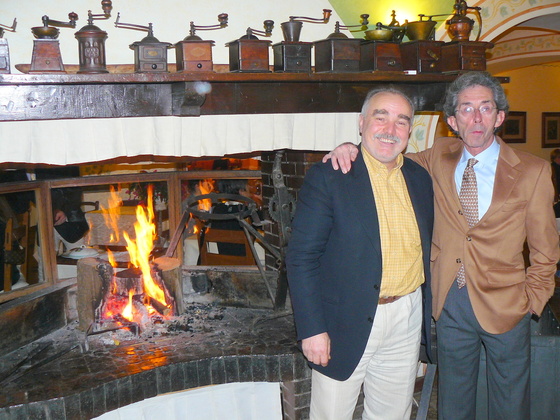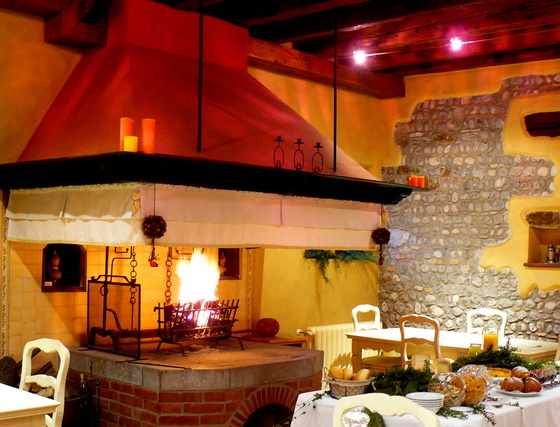
Josko Sirk of La Subida (left) with Collio winemaker Paolo Caccese
CORMONS, Italy--From the heart of many country restaurants here, from the heart of many country homes, there emanates the warm glow of the hearth, the fogolar friulan. More than a fireplace, more than a rustic stove, the fogolar is the focal point of community life, a vestige of times when families huddled in caves, a reminder of campfires and bonfires. The fogolar is both kitchen cooktop and radiant heater, a carefully tended, multi-purpose community altar.
The word fogolar is local, Slovenian-influenced dialect (the Italian word for hearth is fogolare), but the term Fogolar Friulan signfies a level of hospitality unique to this region of northeast Italy. There is a fogolar in the home of Roberto Felluga, a fogolar in the winery of Edi Keber, a fogolar in the Villa Chiopris guesthouse, a fogolar in the castello of Count Formentini, and then there is the fogolar at La Subida, Josko Sirk's astonishing ktchen in a hamlet near Cormòns called Subida, in all likelihood the best restaurant in all of Friuli.
Let us begin, as Sirk does, with the arrival of the guests. Together, you stir the copper kettle of corn meal bubbling on the fogolar's iron surface, which transmits the heat of the fire by radiant heat. (In point of fact, Sirk has rigged up an automatic stirring contraption so he can spend more time with his guests; my colleague Fred Minnick has a series of great closeups here.) The community gesture of making polenta sets the tone for the evening; You eat melted cheese cracklings called frico, little bread sticks called stuzzicchini and slices of lightly smoked prosciutto from an artisan butcher. Of course you drink the local white, the fragrant friulano, brought by friendly wine makers or chosen from La Subida's extensive list of local bottlings.
Then dinner begins. The first radicchio, sweetened with local apples, highlighted by a touch of horseradish, then smoothed out with melted cheese; a traditional dish of pasta buttata (literally, pasta that's been thrown out) with the short-lived radicchio called Rosa di Gorizia, a sorbet heightened with a touch of Sirk's own, homemade vinegar; a fine cariolo with almonds and scallions; a blizzard of homemade pastries. This is hospitality at its finest, most geniune.
Josko Sirk runs the restaurant with his wife, Loredana, who glides serenly through the cozy dining rooms in a long dress, and is assisted by family members in the kitchen as well. Josko's commitment to fresh and local extends to hunting; game of various sorts (birds, deer, boar) is often on the menu. He works tirelessly on behalf of Collio wines (and champions vineyards on both sides of the border with Slovenia), and was one of the first backers of the yellow Vespa initiative. In good weather, there's a terrace garden outside the trattoria to accommodate riders, walkers and cyclists. And in cold weather, his fogolar provides a warm welcome.
On this note of hospitality, we thank those in Collio, the Consorzio and their collaborators, who made our trip to Italy possible: the winemakers, innkeepers, chefs and administrators, It was a short but memorable visit. There'll be more to say in the weeks ahead, but for now, Buon Cappodanno e Tanti Auguri!, best wishes for a Happy New Year!
And one more footnote. We were not shown the Cormòns wine cooperative, on this trip (I did visit six years ago) but it's worth mentioning that the coop produces a blend called Vino della Pace, the Wine of Peace. There's a vineyard alongside the winery planted with grape varieties from around the world. There's a well-regarded international jazz festival here every October, and the wine is sent to government leaders worldwide as a symbol of world peace.
Above: the fogolar in the breakfast room of Villa Chiopris, a guesthouse owned by the Livon winery.

Leave a comment